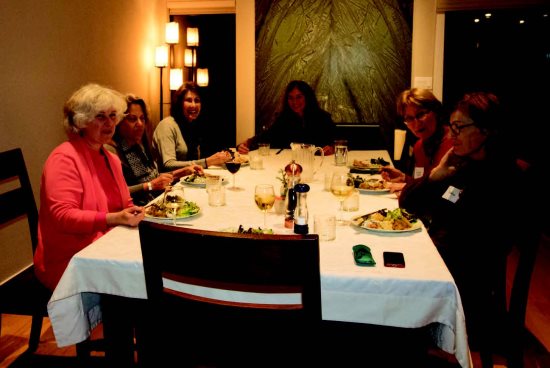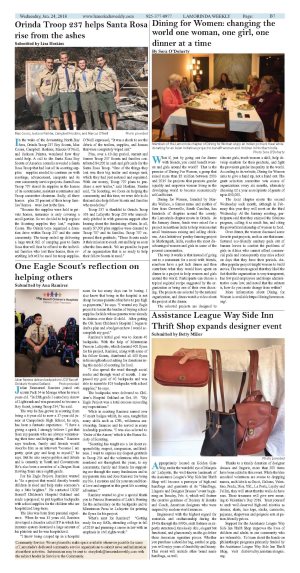| | Published January 24th, 2018
| Dining for Women: changing the world one woman, one girl, one dinner at a time
| | | By Sora O'Doherty |  | | Members of the Lamorinda chapter of Dining for Women enjoy an Indian pot luck meal while donating for an Asian Initiatives project to benefit women and children in Northern India. Photo Sora O'Doherty |
What if, just by going out for dinner with friends, you could benefit women and girls around the world? That is the premise of Dining For Women, a group that raised more than $5 million between 2003 and 2015 for projects that promote gender equality and empower women living in the developing world to become economically self-sufficient.
 Dining for Women, founded by Marsha Wallace, a former nurse and mother of four from Greenville, South Carolina, has hundreds of chapters around the county; the Lamorinda chapter meets in Orinda. At the January dinner, funds were raised for a project in northern India to help women start small businesses raising and selling chickens. Asia Initiatives' poultry farming project in Shohratgarh, India, reaches the most disadvantaged women and girls in some of the poorest communities.
Dining for Women, founded by Marsha Wallace, a former nurse and mother of four from Greenville, South Carolina, has hundreds of chapters around the county; the Lamorinda chapter meets in Orinda. At the January dinner, funds were raised for a project in northern India to help women start small businesses raising and selling chickens. Asia Initiatives' poultry farming project in Shohratgarh, India, reaches the most disadvantaged women and girls in some of the poorest communities.
 The way it works is that instead of going out to a restaurant for a meal with friends, members have a pot luck dinner and then contribute what they would have spent on dinner to a project to help women and girls around the world. Participants can choose a typical regional recipe suggested by the organization or bring one of their own choosing. The projects are selected by the national organization, and diners watch a video about the project at the dinner.
The way it works is that instead of going out to a restaurant for a meal with friends, members have a pot luck dinner and then contribute what they would have spent on dinner to a project to help women and girls around the world. Participants can choose a typical regional recipe suggested by the organization or bring one of their own choosing. The projects are selected by the national organization, and diners watch a video about the project at the dinner.
 The selected projects are designed to educate girls, teach women a skill, help develop markets for their products, and fight the prevalent gender inequality in the world. According to its website, Dining for Women aims to give a hand up, not a hand out. The grant selection committee vets scores of organizations every six months, ultimately choosing 12 a year as recipients of grants of up to $50,000.
The selected projects are designed to educate girls, teach women a skill, help develop markets for their products, and fight the prevalent gender inequality in the world. According to its website, Dining for Women aims to give a hand up, not a hand out. The grant selection committee vets scores of organizations every six months, ultimately choosing 12 a year as recipients of grants of up to $50,000.
 The local chapter meets the second Wednesday each month, although in February this year they will meet on the third Wednesday. At the January meeting, participants said that they enjoyed the fabulous program, calling it so much fun, and citing the powerful relationship of women to food.
The local chapter meets the second Wednesday each month, although in February this year they will meet on the third Wednesday. At the January meeting, participants said that they enjoyed the fabulous program, calling it so much fun, and citing the powerful relationship of women to food.
 Over dinner, the women discussed some favorite past projects, such as one that manufactured eco-friendly sanitary pads out of banana leaves to combat the problems of girls in Africa who cannot afford commercial pads and consequently may miss school on days that they have their periods. Another popular project taught women to build stoves. The women agreed that they liked the fact that the organization is very transparent, has few paid employees and keeps administrative costs low, and noted that the subtext is, how do you create change from within?
Over dinner, the women discussed some favorite past projects, such as one that manufactured eco-friendly sanitary pads out of banana leaves to combat the problems of girls in Africa who cannot afford commercial pads and consequently may miss school on days that they have their periods. Another popular project taught women to build stoves. The women agreed that they liked the fact that the organization is very transparent, has few paid employees and keeps administrative costs low, and noted that the subtext is, how do you create change from within?
 More information about Dining for Women is available https://diningforwomen.org/.
More information about Dining for Women is available https://diningforwomen.org/.


|
| | | | | | | | | | | | |



